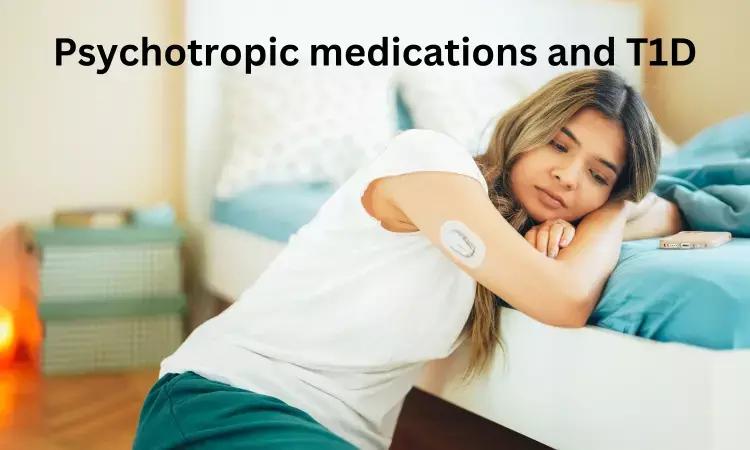Noteworthy Rise Of Psychotropic Medication Use Among Children With Type 1 Diabetes: JAMA
- byDoctor News Daily Team
- 27 July, 2025
- 0 Comments
- 0 Mins

Type 1 diabetes (T1D) is one of the most common chronic condition onsets during childhood. Type 1 Diabetes Mellitus and psychosocial illness influence each other in multiple ways. The extent of psychosocial disorders in children with T1DM remains unknown.
A new study published in JAMA Network Open discussed the benefits and risks of psychotropic medications for children and adolescents with T1D and highlight the need for clinical attentiveness and recommendations. Study suggests psychotropic prescriptions, such as hypnotics, ADHD medications and antidepressants, have increased exponentially in children and adolescents with type 1 diabetes.
Researchers also note that psychiatric care was the primary prescription source among those with T1D receiving a prescription for psychotropic medication, and up to 50.1% of treatments lasted more than 12 months.
The population based cohort study used data from multiple Swedish registers. The main study cohort included children and adolescents residing in Sweden from 2006 to 2019 and was followed up until the earliest of December 31, 2019, 18th birthday, emigration, or death. The primary outcomes were trends and patterns of psychotropic medication dispensation (including antipsychotics, antidepressants, anxiolytics, hypnotics, mood stabilizers, and medications for attention-deficit/hyperactivity disorder [ADHD]), psychotropic medication initiation, and history of neurodevelopmental and psychiatric diagnosis. Cumulative incidence curves and Cox proportional hazard models were used to estimate the aggregated incidence and hazard ratios of medication initiation after diabetes onset.
The key findings of the study are
• Total of 37,23,745 children and adolescents (1 896 199 boys [50.9%]), out of which 13 200 (0.4%; 7242 boys [54.9%]) had T1D.
• Between 2006 and 2019, psychotropic medication dispensation increased from 0.85% to 3.84% among children and from 2.72% to 13.54% among adolescents with T1D, consistently higher than their peers without T1D.
• The most commonly dispensed medications included hypnotics, ADHD medications, anxiolytics, and selective serotonin reuptake inhibitors, and all exhibited increasing trends.
• For those with T1D, psychiatric care was the primary prescription source, and up to 50.1% of treatments lasted more than 12 months.
• In addition, children and adolescents with T1D showed higher cumulative incidence and hazard ratios of medication initiation after diabetes onset than their same-age and same-sex counterparts.
Researchers concluded that “This cohort study found an increasing trend in psychotropic medication dispensation among children and adolescents with T1D from 2006 to 2019, persistently higher than those without T1D. These findings call for further in-depth investigations into the benefits and risks of psychotropic medications within this population and highlight the importance of integrating pediatric diabetes care and mental health care for early detection of psychological needs and careful monitoring of medication use.”
Reference: Liu S, Lagerberg T, Ludvigsson JF, et al. Psychotropic Medication Use in Children and Adolescents With Type 1 Diabetes. JAMA Netw Open. 2023;6(10):e2336621. doi:10.1001/jamanetworkopen.2023.36621
Disclaimer: This website is designed for healthcare professionals and serves solely for informational purposes.
The content provided should not be interpreted as medical advice, diagnosis, treatment recommendations, prescriptions, or endorsements of specific medical practices. It is not a replacement for professional medical consultation or the expertise of a licensed healthcare provider.
Given the ever-evolving nature of medical science, we strive to keep our information accurate and up to date. However, we do not guarantee the completeness or accuracy of the content.
If you come across any inconsistencies, please reach out to us at
admin@doctornewsdaily.com.
We do not support or endorse medical opinions, treatments, or recommendations that contradict the advice of qualified healthcare professionals.
By using this website, you agree to our
Terms of Use,
Privacy Policy, and
Advertisement Policy.
For further details, please review our
Full Disclaimer.
Recent News
DME Gujarat extends PG Ayurveda, Homeopathy round...
- 05 November, 2025
NEET counselling: CENTAC publishes round 3 provisi...
- 05 November, 2025
Marksans Pharma UK arm gets marketing nod for Exem...
- 05 November, 2025
Zydus Wellness net sales up by 31 percent in Q2 FY...
- 05 November, 2025
Daily Newsletter
Get all the top stories from Blogs to keep track.


0 Comments
Post a comment
No comments yet. Be the first to comment!